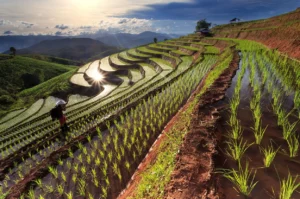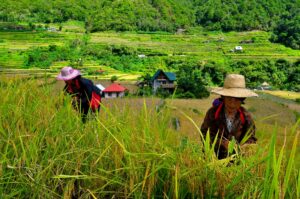In 1988, we addressed ourselves to developing a vision of the future, to better anticipate tomorrow’s problems, and to define our search for innovative solutions over the next decade. The world is becoming ever more complicated. Concerns about the future—the availability of food, conservation of resources, and sustainability of the environment—highlight increasingly complex problems. The solutions to these problems must be sought now.

.
The year 1988 was another watershed in IRRI’s evolution.
The world of rice and rice science continues to change, at an ever-accelerating pace. The physical and economic characteristics of rice production and consumption—and their long-term prospects—are posing new challenges. Rice research and scientific advances of potential relevance to rice have created new opportunities.
 In 1988, we addressed ourselves to developing a vision of the future, to better anticipate tomorrow’s problems, and to define our search for innovative solutions over the next decade. Extensive debate and interactive thinking by IRRI staff and expert international consultants culminated in October with the endorsement by the IRRI Board of Trustees of the strategy document IRRI toward 2000 and beyond.
In 1988, we addressed ourselves to developing a vision of the future, to better anticipate tomorrow’s problems, and to define our search for innovative solutions over the next decade. Extensive debate and interactive thinking by IRRI staff and expert international consultants culminated in October with the endorsement by the IRRI Board of Trustees of the strategy document IRRI toward 2000 and beyond.
The objectives
To generate and disseminate rice-related knowledge and technology of short- and long-term environmental, social, and economic benefit and to help enhance national rice research systems.
To increase rice production efficiency and sustainability in all rice-growing environments through interdisciplinary research and to ensure the relevance of IRRI research and the complementarity of international and national research efforts through close collaboration with national programs.
The world is becoming ever more complicated. Concerns about the future—the availability of food, conservation of resources, and sustainability of the environment—highlight increasingly complex problems. The solutions to these problems must be sought now.
We designed a research strategy for IRRI that aims at minimizing the problems related to adequate rice production on an equitable and sustainable basis by maximizing the potential to solve the problems.
Each year, the world must feed 80 to 100 million more people, most of them in the less developed and poorer countries. Virtually all the people who depend on rice as their primary food lives in the less developed countries. Half the world’s rice is consumed by those who produce the crop, most of them resource-poor farm households.
To meet the projected growth in demand for rice, we estimate that the world’s annual rough rice production must increase by an astronomical 65% (from today’s 458 million tons to 758 million tons) by 2020. For the leading rice-growing countries of South and Southeast Asia, production will need to double.
We identified five important issues to consider in devising IRRI’s research strategy for the 1990s.
- Current forecasts of rice supplies do not take into account factors that could adversely affect the long-term security and stability of rice production. Factors that affect production apply equally to both favorable and unfavorable rice ecosystems. In the foreseeable future, the world will continue to rely heavily on the favorable rice-growing ecosystems, particularly to feed urban consumers.
- The vulnerability of these systems to degradation demands continuing and, in some aspects, increased attention. Rapid scientific advances in many fields have the potential to help IRRI and its partners find solutions to continuing and emerging problems. A wide range of interrelated factors-political, economic, institutional-will contribute to increasing and sustaining rice production, protecting the environment, and improving the well-being of farmers
Designing the strategy
Many of the development issues related to rice are interdependent. The range of entry points for research is extensive. Two aspects of strategic decision-making guided our decisions-research policy and research resource allocation priority.
Policies
Research relevance
Broad-based research, including research on socioeconomic aspects of rice production, is needed to characterize the rice ecosystems in terms of people and their environment, to improve understanding of the farming systems within which rice is produced, and to refine the definitions of the kinds of technologies that should be developed. IRRI will intensify its dialogue with national partners, to improve our understanding of farming systems and the needs of prospective users and beneficiaries of rice research results.
Environmental sustainability
Attention to the impact of high yield-producing technologies becomes more urgent as cropping intensifies. All our programs will be driven by, and many will be specifically directed to addressing, concerns about the effects of rice production systems on the environment.
Efficiency and equity
An efficient research system would allocate resources to return the same marginal social benefits per unit of research input, regardless of where that input was made. It would not be concerned with who received the benefits. But equity demands that IRRI be concerned with how the benefits from research investment are distributed. We will direct IRRI research toward improving both production efficiency and equitable returns to all rice-dependent groups, particularly those in the less favorable ecosystems.
Women and rice
The role of women in rice research and rice farming has both efficiency and equity implications. Analysis of the contribution of women to rice production, marketing, and consumption; identification of technologies that reduce the burden of women without displacing their income-earning capacity; and development of processing techniques that conserve the level of essential nutrients in rice will help focus research on the ultimate beneficiary of rice research: the whole family.
Disciplinary strength and interdisciplinary focus
A recurring dilemma in research management is how to integrate the strengths of different scientific disciplines toward seeking solutions to complex problems. IRRI is instituting a new program structure to facilitate the pursuit of excellence in both disciplinary and interdisciplinary research.
Priorities
The strategy is to strike an optimum balance of effort devoted to several alternatives. IRRI’s programs will be oriented to the major rice ecosystems and to the farming communities and consumers dependent on them.
Collaborative research on the less favorable ecosystems will increase. Consistent with environmental enhancement and sustainability, efforts will be directed toward securing yield gains in favorable ecosystems and seeking new yield potentials in all ecosystems. Our research efforts will move toward strengthening IRRI’s scientific base, using results and techniques emerging from the frontiers of scientific discovery.
We are committed to helping strengthen national rice research programs and will be increasing collaborative work and knowledge sharing with all IRRI’s partners. We look toward a mutually supportive global rice research system.
While IRRI will continue to focus on Asia, its worldwide responsibilities cover all regions. We will contribute to research and to strengthening national programs in Africa and Latin America in the context of the activities of other international agricultural research centers.






